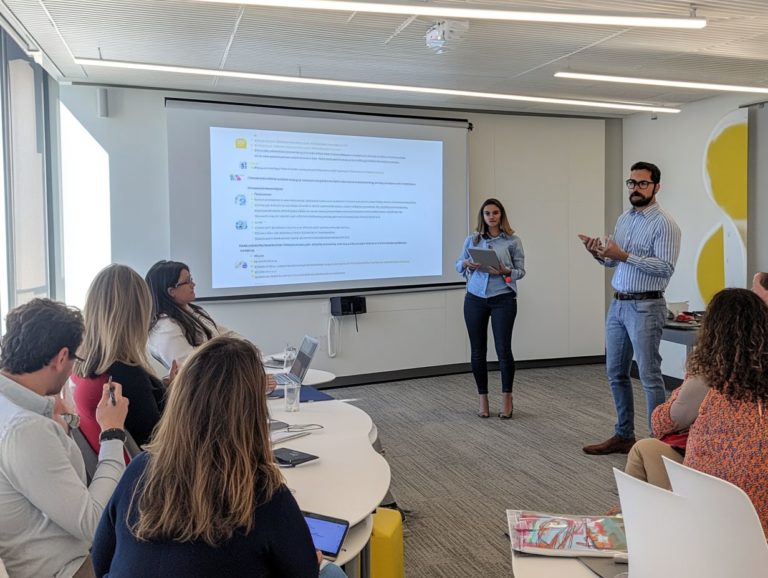“How to Motivate CRM Users During Training”
In the dynamic realm of today’s business landscape, effective Customer Relationship Management (CRM) training stands as a cornerstone for maximizing user engagement and productivity.
The key to success in this training hinges on one key factor: motivation. Let s explore why motivation matters in CRM training, highlighting common challenges users face while presenting practical strategies to cultivate a positive learning environment.
Set clear goals, use interactive methods, and provide continuous support. By doing so, you can unlock the potential of CRM users, paving the way for enduring success within your organization.
Contents
Key Takeaways:

Motivation is crucial for successful CRM training to ensure user engagement and adoption. Identify the needs and concerns of CRM users to address challenges and tailor training accordingly. Strategies such as creating a positive learning environment, setting realistic goals, and providing ongoing support can motivate CRM users during training. Start implementing these strategies today to boost your CRM success!
The Importance of Motivation in CRM Training
Motivation is a key factor in the success of CRM training programs, influencing user adoption, engagement, and overall satisfaction with the system.
Implementing effective motivation strategies not only eases the transition during change management but also cultivates a culture of continuous learning and improvement.
Understanding what holds users back helps create effective training frameworks. With robust leadership support, you can leverage customer insights to customize user training, ensuring that employees feel valued and are more inclined to wholeheartedly embrace the CRM system.
Why Motivation is Key to Successful Implementation
Motivation plays a crucial role in your successful adoption and implementation of CRM systems, as it profoundly impacts user engagement and satisfaction.
When you feel motivated, you re more inclined to dive into the various functionalities these tools offer, unlocking deeper insights into customer behavior and preferences. This not only enhances your daily interactions but also aids in developing tailored training programs that resonate with actual user needs, ultimately fostering stronger customer relationships.
The importance of leadership in creating a supportive and encouraging environment cannot be understated. When leaders actively champion a culture that values seeking customer insights, it ignites enthusiasm among users like yourself, giving you the power to make the most of all available CRM features.
Understanding the Needs of CRM Users

Grasping the needs of CRM users is essential for navigating common hurdles like user reluctance and achieving effective training.
You must evaluate both individual and team requirements to create customized training programs that elevate user experience and enhance data quality. This insight enables you to develop tailored communication strategies that address specific concerns, making transitions during CRM implementation significantly smoother.
Identifying Common Challenges and Concerns
Identifying common challenges and concerns faced by CRM users is essential for effective change management and enhancing the overall user experience.
Many individuals involved in CRM implementation often feel a sense of reluctance stemming from unfamiliarity with the technology or previous negative experiences. This apprehension can heighten when users raise concerns about data quality; after all, inaccurate or incomplete data can significantly undermine their confidence in the system.
By analyzing customer insights, it becomes evident that targeted training and ongoing support are essential. Customized workshops can serve as a gentle introduction to the platform, while regular feedback sessions can effectively address concerns and iteratively refine data management practices.
These proactive strategies not only foster trust but also elevate overall engagement with the CRM.
Strategies for Motivating CRM Users
Implementing effective strategies to motivate CRM users can greatly enhance their engagement and overall satisfaction with the system. This results in improved training outcomes and higher adoption rates.
Incorporating game-like features, continuous support, and recognition programs is essential in this endeavor.
By establishing realistic goals and offering meaningful feedback, organizations can create an environment where users feel valued. This inspires them to fully embrace the CRM system, unlocking its true potential.
Creating a Positive Learning Environment

Creating a positive learning environment is crucial for effective user training and long-term CRM adoption. Users want to feel supported and engaged throughout the entire process.
This supportive atmosphere boosts user confidence and encourages open dialogue. Such communication is vital for addressing challenges as they arise.
Employing effective communication strategies, such as regular feedback sessions and teamwork tools, can facilitate meaningful interactions between users and trainers.
Start implementing continuous training programs now to adapt to evolving needs. This enables users to progressively develop their skills.
Initiatives like peer mentorship or interactive workshops foster a sense of community. This makes users more inclined to share insights and collaborate on problem-solving. Ultimately, this approach enhances the overall learning experience.
Setting Realistic Goals and Providing Incentives
Setting realistic goals and providing incentives are essential strategies for enhancing CRM adoption and user engagement. Achievable goals boost confidence and allow users to celebrate small victories, fostering a sense of accomplishment.
Recognition programs are instrumental in elevating morale. By acknowledging efforts and achievements, organizations nurture a positive environment where motivation flourishes. This synergy between well-defined objectives and recognition can lead to improved training outcomes, enhancing performance and satisfaction within the team.
Engaging and Encouraging CRM Users
Engaging and motivating CRM users is crucial for cultivating a positive user experience. This ensures they maximize the system’s features.
By integrating interactive training methods and offering continuous support, users can feel more confident in their CRM skills.
Mobile CRM solutions significantly enhance accessibility, allowing users to engage with the system at their convenience, no matter the time or place.
Using Interactive Training Techniques

Interactive training techniques can supercharge your training effectiveness! They transform the learning journey into an engaging and enjoyable experience.
Take gamified learning modules, for example; they turn what could easily be tedious content into thrilling challenges. You have the chance to earn points and unlock levels as you advance, igniting motivation and fostering healthy competition among peers.
Then there are role-playing scenarios that transport you into realistic situations. This allows you to hone your CRM skills in a safe environment. This immersive experience boosts your confidence and competence, making you better prepared for real-world applications.
These innovative methods have proven to enhance user engagement significantly, leading to improved retention of CRM knowledge. When information is tied to an interactive and enjoyable experience, you are far more likely to remember it.
Start motivating your CRM users today and watch engagement soar!
Providing Ongoing Support and Feedback
Ongoing support and constructive feedback are vital for a positive user experience during and after CRM training.
Today s business world is fast-paced. A strong support system, like mentorship programs and accessible help desks, can ease your transition to new systems.
These resources provide practical help and build trust. You should feel comfortable seeking assistance whenever you need it.
Effective communication is essential for quickly addressing concerns. This ensures you feel heard and valued.
By creating open channels for feedback, organizations nurture a culture of continuous improvement. This makes adapting to new processes smoother.
Measuring and Maintaining Motivation
Keeping motivation high is key! It drives user engagement and boosts your CRM success.
This process allows you to track progress and pinpoint areas for improvement.
Implementing recognition programs and ongoing training initiatives enhances user morale and commitment to the CRM system. This fosters a culture of continuous learning and adaptation.
Tracking Progress and Addressing Concerns
Tracking your progress and addressing user concerns are vital for effective change management and maintaining high user engagement.
Implement systems that facilitate seamless monitoring of achievements, ensuring that milestones are recognized and reviewed.
Establish feedback mechanisms that allow users to voice concerns promptly. This enables organizations to respond swiftly to any issues.
This proactive approach helps identify areas for improvement and enhances data quality. Accurate user input is essential for refining processes.
By prioritizing user satisfaction and providing timely support, you foster a community of trust and commitment. This makes it easier for everyone to embrace change and drive success.
Continuing to Reinforce Motivation after Training
Continuing to reinforce motivation after training is vital for your engagement and long-term success with Customer Relationship Management (CRM). Prioritize continuous training to deepen your skills.
Incorporate recognition programs that celebrate individual and team achievements. This can significantly boost your enthusiasm and commitment.
Focus on improving your experience by integrating feedback from participants into future sessions. By listening to your needs, organizations can tailor support, elevate your learning, and foster collaboration.
Frequently Asked Questions
What are some common challenges in motivating CRM users during training?
Common challenges include a lack of interest, difficulty understanding CRM’s value, and reluctance to change from previous systems.
How can I create a positive training environment to motivate CRM users?
Create a supportive environment by setting clear, achievable goals. Provide feedback and recognition, and offer incentives for participation.
What role does leadership play in motivating CRM users during training?
Leadership is crucial. They should participate actively, lead by example, and communicate the importance of CRM to their team.
How can I make the training content more engaging and motivating for CRM users?
Use various learning methods like hands-on exercises and real-life scenarios. Incorporate gamification and customization options to boost motivation.
What strategies can I use to sustain motivation for CRM users beyond the training period?
Provide ongoing support, refresher training sessions, and regularly communicate the benefits and results of using the CRM.
How important is it to address individual learning styles when motivating CRM users during training?
Addressing individual learning styles is crucial. Tailoring training to match how each user learns increases engagement and material retention.
Start engaging with your CRM today and watch your success soar!






